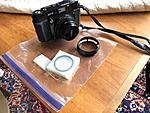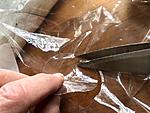Does that camera have an eye level prism finder? Seems that would work much better than a chimney finder. I know my SL66 has one, not sure about your model though.
Apologies for not paying attention that your questions/concerns relate to medium format. I do have a work-around for my Fuji/Voigtlander cameras which works well - and is as simple as placing the entire camera inside a gallon-sized Ziplock bag, and using a filter to first create a template (with camera positioned in bag), then removing the filter and making the cut...and, finally, replacing the filter over the now very tightly sealed opening around the lens:


...and leaving the bottom of the bag open to allow sneaking your (dry!) hands in to hold/adjust the camera. Plus you can also sneak a cable release up into the bag and mount the camera on a tripod if need be.
Note: you can get fancy (as I do sometimes) and do the same thing with the viewfinder by removing/cutting plastic/replacing the threaded eyepiece cover if you want a clearer view.
I managed to spend three weeks in Scotland last spring without rain...even the Scots were amazed...Good Luck!!
One from the Isle of Skye, and one from a lunch break...
"Landscapes exist in the material world yet soar in the realms of the spirit..." Tsung Ping, 5th Century China
Everyone, Thanks so much for taking the time to respond and pass along ideas. Since several of you had questions, and I want to prove that I really do read your comments:
Interneg: The cruise is Viking's "British Isles Explorer" which spends half the trip in Scotland, and half in the U.K. I have to be careful with wording, because Scotland and Wales don't consider themselves part of England! (I lived in England for 6 years, spent some time at Exxon's refinery in South Wales, and as much hiking as I could up in North Wales.) In Scotland we have a couple of days in the Highlands near Inverness, a day each in the Shetlands and Orkneys, and a day in Edinburgh. Then a day each in Liverpool (England), Holyhead (Wales), Dublin (Ireland) and a bit in London (where I lived) before heading stateside. The cruise is high season (August) but I posted my question now because I want to test camera, development techniques, maybe some filters in the coming months before I go (especially in damp weather when I normally don't do photography).
Mark: Only B&W because that's what I can develop myself and print in my darkroom. I'll use my iPhone for color.
Dave: I'm using my Peak Design camera backpack, I spoke with the company and they said the pack is highly weatherproof, good for anything except standing in a downpour for hours, which I promise I won't do.
Kevin: There is an eye-level finder for the Rollei 6008, but I don't have one (pretty costly even used) and more to the point, it adds weight and bulk to an already heavy camera.
John: Thanks for the detailed advice on using a plastic bag as a camera cover if needed, I hadn't thought of positioning it with the bottom open so I could reach up to camera controls. One of those things that seems obvious when suggested, but I wouldn't have thought of it.
August in Scotland, especially on the coast, is usually pretty sunny - maybe the odd downpour, but it's windy enough (particularly in the northern isles) that it's often gone much faster than you'd think. Make sure you bring suitable sun protection for yourself - the wind will deceive you until you get burnt. Temperatures can be anywhere from 13-30c. If you get an especially warm day, the haar will often roll in from the sea later in the day & that can drop temperatures fast (though it's more damp than outright wet). Given where the ports that the bigger ships can berth are (specifically Invergordon and Ullapool), you may well find yourself stuck on a bus (on some quite entertaining roads) for several hours, then quick-marched around a site of tourist interest - dodging the buses and watching the tour groups getting herded at speed through various sites is a reality of August-September here. There's no point in worrying about techniques as long as you can land a normal contrast scene on G2. The main problem you might run into is that the light may be much better quality quite late in the day (or very early in the morning) - and that while the best images may be made on the edges of the worst weather, that's more usually a March-May or September/ October thing.
Only specific location advice I'd give (as I don't know what sort of itinerary you are being kept to) is that Edinburgh in August is chaotic with the Festival/ Fringe. If that's your thing, go for it. Worth visiting Stills gallery near Waverley station.
I like using a yellow filter on my B&W shots regardless of sky/cloud cover.
I use a supermarket carrier bag as a rain cover - it is simple, quick to deploy and doesn't give too much sail area in the wind.
A tripod is always a good idea - the light levels can be low in the rain and mist.
I use a bungy strap to attach my camera bag to the tripod, to add ballast to the camera, to help cope with the wind.
I have several film backs for my RB67 - changing film in the rain is no fun.
As others have said, have several microfibre cloths separately wrapped, to keep the filter dry.] over the course of the day.
Leave the lens cap on until you are ready to shoot to keep your filter dry.
Take everything out of your camera bag at the end of each day to allow everything to dry properly overnight.
Buy insect repellent - the Scottish Midges can eat you alive and get in every nook and cranny of your clothing.
A warm waterproof coat, hat and gloves are absolute must haves.
Personally, I find the best light is either when it has just started to rain or just as the rain might be stopping - but you have to be prepared to get wet (sometimes very wet).
The summer evenings are very long and often have fabulous light, as do the mornings if you can get up that early.
Good luck and have fun - Scotland is a wonderful place and the light can be magical.
Martin
I spent a week on Orkney in June of 2014 - it was a bit windy, a bit cool, but not very rainy. I took both a 4x5 and a Hasselblad, and although I shot with both, it was a real slog taking both camera rigs (with multiple lenses, etc) on a trip like that. Looking back, it would have been better to just take one of the two, but I can't say which one I would pick now.
There were some places that I setup the 4x5 where the wife was sure either the camera or I (or both) would get blown off the rocks and into the water, but I guess I got lucky...

Peter, we have the same camera! Another 6008i2 user here
Nice to see a fellow Rollei 6008 user.
Having used this as my main camera for almost 2 decades (my how time flies) in Norway (think Pacific Northwest, but colder and windier), you learn to deal with moisture. The camera is pretty well sealed, even when using a waist level finder (WLF). I typically either have an umbrella or a raincoat with a hood, and by keeping myself over the camera, can keep it mostly dry, and as others pointed out, a yellow or other filter over the lens helps. A lens hood also helps, the standard 80-150mm Bay VI hood works well, the 90mm Macro doesn't really need one. Depends on which lenses you have and plan to bring along. The 300 has a built in hood, the 180 uses Bay 104 size.
I carry a pocket packet of kleenex, use one to simply gently blot away any drops that make it onto the finder or filter, and microfiber or paper lens cleaning cloth to use afterwards.
The camera stays in it's bag until I'm actually ready to take a picture, which helps keep the moisture to a minimum. Typically you won't be in pouring rain, squalls will come and go, there will be mist, fog, some wind blowing the rain sideways, etc. Wait out the worst, but be ready when it lets up.
You'll be fine, and you'll get some incredible images I'm sure! The Rollei is the perfect camera for that kind of trip.
Bookmarks